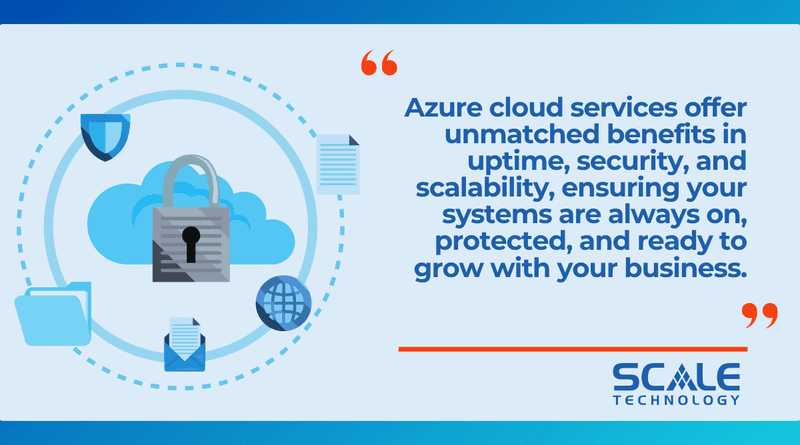Leading a small business means you can't afford slow, clunky tech. IT services need to be fast, secure, and smart to support growth. That's where partnering with Scale Technology to use Azure cloud services becomes essential. Beyond the buzzwords, Azure offers tangible benefits for uptime, security, and scalability. Here's a clear breakdown of what Azure can do for your business.
Key Takeaways:
- Azure's core IaaS includes virtual machines, storage (Blob, Disk, File, Queue, Table), and networking.
- VM types: General, compute-optimized, memory-optimized, GPU, and storage-optimized.
- PaaS tools like App Service and Functions handle scaling, updates, and deployments.
- For autoscaling apps, use App Service or AKS with defined CPU/memory rules.
- Use Azure Pipelines for CI/CD; integrates with GitHub, Jenkins, Terraform.
- Serverless tools: Azure Functions, Logic Apps. Containers: ACI, AKS, ACR.
- Databases: Azure SQL (relational), Cosmos DB & Table (NoSQL), MySQL/PostgreSQL (open-source).
- Hybrid tools: Azure Arc, Stack, VPN; multi-cloud supported via Arc and Lighthouse.
- Backup/disaster recovery: Azure Backup & Site Recovery with geo-redundancy.
- Azure pricing: Pay-as-you-go, cost tools include Price Calculator, Cost Management.
- Security: Defender for Cloud, 256-bit encryption, GDPR/HIPAA/SOC compliance.
- Learning: Microsoft Learn, free Azure credits, AZ-900 covers fundamentals.

What Core Infrastructure Services Does Microsoft Azure Offer?
Azure provides robust infrastructure services to build, host, and run systems in the cloud. These core IaaS offerings include virtual machines, storage, and networking. This allows businesses to have full control similar to physical servers, eliminating the need to manage physical equipment and saving on costs and space.
Selecting the appropriate virtual machine configuration involves choosing a size that matches your workload. Partner with Scale Technology, and learn how Azure offers types such as general, compute-optimized, memory-optimized, GPU, and storage-optimized to suit various tasks.
- General: Ideal for light applications and daily use.
- Compute-Optimized: Suitable for high-speed tasks like rendering.
- Memory-Optimized: Perfect for big data tasks.
- GPU: Designed for AI and gaming applications.
- Storage-Optimized: Focused on tasks involving heavy file use.
When configuring virtual machines, choose the size, region, and storage—and set autoscaling if necessary. Selecting a region near users minimizes delays. Azure’s pay-as-you-go model and scheduling tools are essential for cost management.
For more on transitioning to the cloud and partnering with Scale Technolog, visit their insights and explore core offerings on Microsoft’s Azure Cloud Services.
How Does Scale Technology Help Support Scalable Application Deployment with Azure Cloud Services?
For extra ease and support, partnering with Scale to use Azure enhances application scalability through its PaaS tools. App Service and Functions allow quick deployment and handling of setups, scaling, and updates without server management worries. Key integrations with GitHub and Visual Studio streamline the DevOps process.
Applications can leverage Azure App Service or Azure Kubernetes Service (AKS) for auto-scaling. Setting scaling rules ensures applications remain fast as demand fluctuates, charging only for resources in use.
Efficient scaling is achieved through a microservices architecture, using Azure tools like API Management and Event Grid to connect components, alongside Blob storage and queues for managing large tasks. Azure Monitor provides performance insights to preemptively tackle scaling issues explore strategies here.
What Makes Azure Cloud Services Effective for DevOps and Automation?
Azure Cloud Services integrate seamlessly with popular DevOps tools like GitHub, Jenkins, and Terraform, enhancing testing, building, and deployment processes. Azure Boards and GitHub streamline task tracking, providing a comprehensive view of code, builds, and tasks.
Setting up DevOps pipelines involves Azure DevOps for code repositories and pipelines management. Users configure build agents, tests, and deployment specifics. Azure Pipelines enable CI/CD processes, providing scalability that supports multiple daily builds across regions.
For detailed strategies, visit Scale Technology's best practices. Explore GitHub Copilot for code assistance within Azure’s ecosystem.
Importantly, Azure Cloud Services empower businesses with the tools necessary for efficient, controlled, and rapid development processes—especially when you partner with Scale Technology..
What Storage and Database Solutions Are Available in Azure Cloud Services?
What Types of Storage Services Does Azure Cloud Services Provide?
Azure Cloud Services offers five major storage options: Blob, Disk, File, Queue, and Table.
- Blob: Ideal for storing large files such as photos and videos.
- Disk: Primarily used for virtual machine storage.
- File: Facilitates shared access among team members.
- Queue: Transfers messages between application services.
- Table: Suitable for systems not requiring full databases.
Blob and File storage are top choices for efficient builds, capable of handling large data sizes and enabling remote teamwork. Rules can be set to transfer old files to cost-effective plans and manage data access.
Which Database Options Are Available, and When to Choose SQL vs NoSQL in Azure Cloud Services?
- SQL: Optimal when data is structured and stable.
- NoSQL: Best suited for rapidly changing or dynamic data.
Azure SQL is a fully managed service using the SQL language, perfect for applications requiring structured data, like retail or banking systems. Cosmos DB and Table Storage provide high-speed access for applications with changing inputs, such as gaming and social apps. Many teams use both SQL for transactions and NoSQL for real-time user tracking.
How Can Users Maximize Managed Databases in Azure Cloud Services?
Tools like Azure SQL, Cosmos DB, and Databases for MySQL and PostgreSQL simplify management. Users select a region and size, with no hardware or updates needed. Cosmos DB offers low latency and global availability, supporting key-value and graph data models. Open-source options are available for MySQL and PostgreSQL applications.
Backups, monitoring, and alerts are facilitated through Azure services, and are especially simple when you choose to partner with Scale Technology.
How Does Azure Cloud Services Support Hybrid and Multi-Cloud Architectures?
What Tools Enable Hybrid Cloud Setup with Azure Cloud Services?
Key tools include Azure Arc, Azure Stack, and VPN Gateway:
- Azure Arc: Centralizes control of resources from any location.
- Azure Stack: Runs cloud services locally.
- VPN Gateway: Securely links local servers to Azure.
How Do Azure Cloud Services Support Multi-Cloud Setups?
Azure Arc integrates AWS and Google Cloud servers under a unified management interface. It oversees services globally, while Lighthouse manages multiple clients from one screen. Azure DevOps and GitHub ensure consistent performance across setups.
What Are Effective Ways to Link Cloud with On-Prem Tools?
Options include site-to-site VPN, ExpressRoute, or Azure File Sync:
- VPN: Offers speedy and cost-effective solutions.
- ExpressRoute: Bypasses public internet, ideal for sensitive tasks.
- File Sync: Maintains access to older data across locations.
Managing these setups is streamlined with Windows Admin Center and partnering with Scale Technology. Learn more with detailed breakdowns from Microsoft.
What Are Azure Cloud Services' Disaster Recovery and Backup Capabilities?
How Does Azure Cloud Services Support Backups and Long-Term Data Retention?
Azure Backup enables daily, weekly, or scheduled backups, preventing accidental deletion with file locking. Restoration is straightforward, managed from a central location.
What Services Support Disaster Recovery in Azure Cloud Services?
Azure Site Recovery maintains live system copies in different data centers. It automatically redirects operations if a center fails, with global data centers reducing latency.
How Does Scale Technology Use Azure Cloud Services To Help Companies Stay Online?
System behavior rules enable automatic recovery from failures, transitioning operations to unaffected regions. Group settings and controlled restore permissions ensure clarity and safety. Charges only apply for used time. Tutorials and templates are available for robust cloud backup strategies. More details in Azure's SLA and learn how Azure can help.
What Are the Costs and Pricing Models in Azure Cloud Services?
How Does the Azure Cloud Services Pricing Model Work?
Azure employs a "pay-as-you-go" model, allowing users to pay for active services only. Costs can depend on time, data use, or size, with pricing varying by location and service.
Which Tools Can Help Plan and Track Spending?
The Azure Price Calculator provides upfront cost estimates. Azure Cost Management tracks usage and expenses, with alert functionalities to manage budgets effectively.
How Can You Minimize Monthly Expenses with Azure Cloud Services?
- Eliminate unused files and shut down test machines.
- Implement auto-shutdown timers.
- Opt for reserved instances for frequent VM use.
- Select cost-effective regions and downscale during low usage.
Explore Microsoft's cost optimization guide and find additional strategies on controlling cloud computing costs with help from Scale Technology.
How Secure and Compliant Are Azure Cloud Services?
What's Included in Microsoft Defender for Cloud?
Defender for Cloud monitors risks, workloads, and access, offering insights and proactive security measures with Security Copilot.
What Compliance Standards Do Azure Cloud Services Meet?
Azure adheres to over 100 global standards, such as HIPAA, SOC, ISO, and GDPR, catering to sectors like health, finance, and government.
How Is Data Protected?
Data is encrypted using 256-bit keys and securely transmitted over TLS. Users can manage keys or allow Azure to handle encryption, ensuring safety in both use and at rest.
How Do Azure Cloud Services Enable Serverless Computing and Containers?
What Is Serverless and Its Uses?
Serverless computing executes code without server management. Azure Functions operate on demand, charging for runtime, while Logic Apps visually automate daily tasks.
How Do Developers Run Container Apps?
Azure offers Container Instances (ACI) for minimal delay execution and App Service for hosting web apps. Utilize Azure Container Registry (ACR) for seamless image storage and deployment.
How Do Kubernetes Clusters Operate?
Azure Kubernetes Service (AKS) orchestrates container deployments efficiently with:
- Deployments in Azure Container Registry.
- Configuration via YAML.
- Activation using kubectl or Azure CLI.
- Real-time management and monitoring with Azure Monitor.
This service efficiently supports both small and large-scale tasks, matching resources to specific needs.
What Resources Help New Users Get Started?
Where Can New Users Find Free Azure Learning Tools?
Microsoft Learn offers structured paths, practice modules, and badges that build skills effectively and at no cost. Real environments enhance practical learning.
The Azure Free Account provides 12 months of basic services and $200 in credits for 30 days. Many learning paths utilize these free resources.
Students benefit from additional perks through educational programs—registration requires no credit card. More insights on cloud empowerment are available at Scale Technology's insights.
What Topics Are Covered in the AZ-900 Certification?
AZ-900 covers a comprehensive range of topics, including:
- Cloud Concepts (20–25%)
- Core Services (15–20%)
- Security and Privacy (25–30%)
- Pricing and Support (25–30%)
This certification assesses knowledge of cloud fundamentals, Azure core services, security measures, and cost management. It serves as an essential foundation for any cloud-related career.
How Can Users Learn the Azure Portal and Tools?
Explore the Azure Portal using the search bar to locate services effortlessly.
Pin essential tools to the dashboard for quick access. Use the "All Services" tab to browse by category, and star preferred items for easy retrieval.
The “?” button provides help resources and access to learning paths. Practice commands with the cloud shell to gain hands-on experience.
Experimentation within the sandbox environment is encouraged to facilitate rapid learning without risk.
Azure Cloud Services enable businesses to build applications, store information, and grow at their own pace. Whether enhancing uptime, cost efficiency, or security, Azure is aligned with business goals. Start leveraging Azure today and explore further at Scale Technology's insights.
Discover the Azure Advantage for Your Business with Scale Technology
Start today with Scale Technology and Azure to revolutionize the way your business operates. Azure cloud services offer unmatched benefits in uptime, security, and scalability, ensuring your systems are always on, protected, and ready to grow with your business. Embrace the potential of a seamless digital transformation and harness the power of cloud computing. Here’s why partnering with Scale to use Azure helps, and explore the strategic edge it provides. Take control of your IT infrastructure, streamline operations, and boost efficiency. Ready to make the first move the right way? Let's embark on this journey together. Contact us to discuss how Azure can be tailored to meet your unique business needs. Your transformation starts here.



